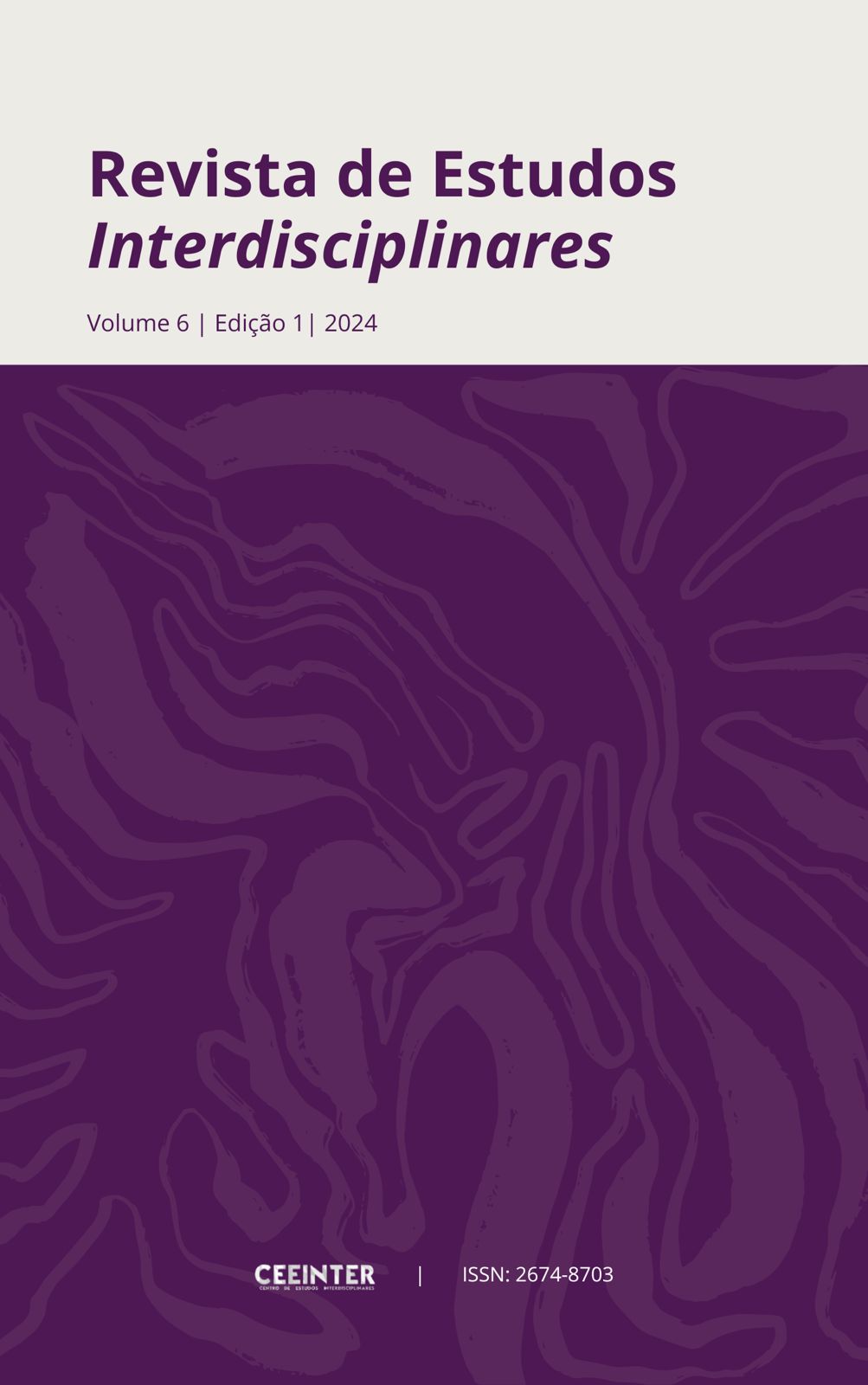ESTADO LAICO E DIREITOS HUMANOS FUNDAMENTAIS
UMA ANÁLISE DA RELATORIA DO PL 580 2007 E DE SUAS PALAVRAS QUE SANGRAM
Visualizações: 336DOI:
https://doi.org/10.56579/rei.v6i1.991Keywords:
Secular State, Same-sex marriage, Institutional discriminationAbstract
This work aims to analyze the speech of Federal Deputy and Pastor Francisco Eurico da Silva, serving as the rapporteur for Bill No. 580/2007. In his report, he recommends rejecting the bill on its merits and supports the approval of Bill PL 5,167/2009, which asserts that relationships between same-sex individuals should not be equated to marriage, stable unions, or family entities. The methodology employed involved bibliographic and documentary research, gathering scientific articles, dissertations, and theses on the fundamental human rights related to sexual and gender diversity and same-sex marriage. This also included a review of pertinent legislation, notably the Federal Constitution of 1988 and the American Convention on Human Rights. The research aims to demonstrate how the progression of conservative agendas in the National Congress often incorporates moral and religious views to underpin speeches characterized by institutional discrimination. Such discrimination tends to marginalize, harm, and endanger marginalized groups. This sociopolitical scenario reflects a form of LGBTphobia that is deeply rooted in biblical precepts, contradicting the secular nature of the Brazilian State. This is further exemplified by the hate speech of some parliamentarians who represent religious entities in their official capacities.
Downloads
References
BLANCARTE, Roberto. El porque de un Estado laico. In: LIENDO, George.; BARRIENTOS, Violeta & HUACO, Marco (eds.). Memorias del Primer Seminario Internacional Fomentando las Libertades Laicas. Lima: Universidad Nacional Mayor de San Marcos: Liberdades Laicas- Perú, 2008.
BORGES, Alexandre Walmott; ALVES, Rubens Valtecides. O Estado laico e a liberdade religiosa na experiência constitucional brasileira - DOI: 10.9732/P.0034-7191.2013v107p227. Revista Brasileira de Estudos Políticos, Belo Horizonte, v. 107, p. 227–266, 2013. Disponível em: https://periodicos.ufmg.br/index.php/rbep/article/view/P.0034-7191.2013v107p227. Acesso em: 19 nov. 2023. DOI: https://doi.org/10.9732/P.0034-7191.2013v107p227
BUTLER, Judith. Quadros de guerra: quando a vida é passível de luto?. 7. ed. Rio de Janeiro: Civilização Brasileira, 2015.
COSTA, Angelo Brandelli; NARDI, Henrique Caetano. O casamento “homoafetivo” e a política da sexualidade: implicações do afeto como justificativa das uniões de pessoas do mesmo sexo. Revista Estudos Feministas, Florianópolis, v. 23, n. 1, p. 137–150, 2015. Disponível em: http://educa.fcc.org.br/scielo.php?script=sci_abstract&pid=S0104-026x2015000100137&lng=pt&nrm=iso&tlng=pt. Acesso em: 19 nov. 2023. DOI: https://doi.org/10.1590/0104-026X2015v23n1p/137
DUARTE, Luiz Fernando Dias et al. (Orgs.). Valores religiosos e legislação no Brasil: a tramitação de projetos de lei sobre temas morais controversos. Rio de Janeiro: Garamond, 2009.
FACCHINI, Regina. Entre compassos e descompassos: um olhar para o “campo” e para a “arena” do movimento LGBT brasileiro. Bagoas - Estudos gays: gêneros e sexualidades, Natal, v. 3, n. 04, 2009. Disponível em: https://periodicos.ufrn.br/bagoas/article/view/2300. Acesso em: 19 nov. 2023.
MACHADO, Maria Das Dores Campos. Política e religião: a participação dos evangélicos nas eleições. Rio de Janeiro: FGV, 2006
MACHADO, Maria Das Dores Campos. Pentecostais, sexualidade e família no Congresso Nacional. Horizontes Antropológicos, Porto Alegre, v. 23, n. 47, p. 351–380, 2017. Disponível em: http://www.scielo.br/scielo.php?script=sci_arttext&pid=S0104-71832017000100351&lng=pt&tlng=pt. Acesso em: 19 nov. 2023. DOI: https://doi.org/10.1590/s0104-71832017000100012
MACHIN, Rosana. Homoparentalidade e adoção: (re) afirmando seu lugar como família. Psicologia & Sociedade, Recife, v. 28, p. 350–359, 2016. Disponível em: https://www.scielo.br/j/psoc/a/MCcMf88RtYyFp84cZVsTrtb/?lang=pt&format=html. Acesso em: 19 nov. 2023. DOI: https://doi.org/10.1590/1807-03102016v28n2p350
MARIANO, Ricardo. Pentecostais e política no Brasil: do apolitismo ao ativismo corporativista. In: SANTOS, Hermílio (Org.). Debates pertinentes: para entender a sociedade contemporânea. Porto Alegre: Edipucrs, 2010.
MARIANO, Ricardo. Laicidade à brasileira: católicos, pentecostais e laicos em disputa na esfera pública. Civitas: revista de Ciências Sociais, Porto Alegre, v. 11, n. 2, p. 238–258, 2011. Disponível em: https://revistaseletronicas.pucrs.br/index.php/civitas/article/view/9647. Acesso em: 19 nov. 2023. DOI: https://doi.org/10.15448/1984-7289.2011.2.9647
OLSEN, Ana Carolina Lopes; KOZICKI, Katya. O papel da corte interamericana de direitos humanos na construção dialogada do ius constitutionale commune na América Latina. Revista Brasileira de Políticas Públicas, Brasília, v. 9, n. 2, 2019. Disponível em: https://www.publicacoes.uniceub.br/RBPP/article/view/6005. Acesso em: 27 out. 2023. DOI: https://doi.org/10.5102/rbpp.v9i2.6005
POPPER, Karl. Conjectures and refutations: the growth of scientific knowledge. Londres: Routledge, 2014. DOI: https://doi.org/10.4324/9780203538074
PINHEIRO FARO, Julio; FRAGA PESSANHA, Jackelline. O casamento civil homoafetivo e sua regulamentação no Brasil. Revista de Bioética y Derecho, Barcelona, n. 32, p. 72–81, 2014. Disponível em: https://scielo.isciii.es/scielo.php?script=sci_abstract&pid=S1886-58872014000300007&lng=es&nrm=iso&tlng=pt. Acesso em: 19 nov. 2023. DOI: https://doi.org/10.4321/S1886-58872014000300007
PIOVESAN, Flávia. Ius constitutionale commune latino-americano em Direitos Humanos e o Sistema Interamericano: perspectivas e desafios. Revista Direito e Práxis, Rio de Janeiro, v. 8, n. 2, p. 1356–1388, 2017. Disponível em: https://www.e-publicacoes.uerj.br/index.php/revistaceaju/article/view/28029. Acesso em: 27 out. 2023. DOI: https://doi.org/10.12957/dep.2017.28029
SARLET, Ingo Wolfgang. Dignidade da Pessoa Humana e Direitos Fundamentais: na Constituição Federal de 1988. Porto Alegre: Livraria do Advogado Editora, 2021.
SILVA, Laionel Vieira da; BARBOSA, Bruno Rafael Silva Nogueira. Entre cristianismo, laicidade e estado: As construções do conceito de homossexualidade no Brasil. Mandrágora, São Paulo, v. 21, n. 2, p. 67–88, 2015. Disponível em: https://www.metodista.br/revistas/revistas-ims/index.php/MA/article/view/6021. Acesso em: 19 nov. 2023. DOI: https://doi.org/10.15603/2176-0985/mandragora.v21n2p67-88
TEIXEIRA, Natália Beatriz Viana. “Cura gay é o meu caralho!”: a normalização da homossexualidade e a Resolução CFP 1/99. 2014. 174 f. Dissertação (Mestrado em Sociologia) - Universidade Federal de Goiás, Goiânia, 2014.
Downloads
Published
How to Cite
Issue
Section
License
Copyright (c) 2024 Interdisciplinary Studies Journal

This work is licensed under a Creative Commons Attribution 4.0 International License.
The Journal of Interdisciplinary Studies adopts the Creative Commons Attribution 4.0 International License (CC BY 4.0), which allows for sharing and adapting the work, including for commercial purposes, provided proper attribution is given and the original publication in this journal is acknowledged.













